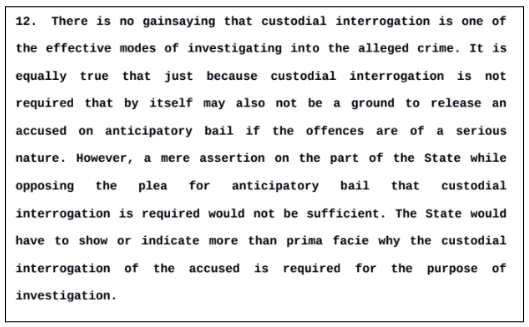In this edition of the Court judgements review, we look at the Delhi HC’s ruling that the names of both mother and father should be mentioned in all documents relating to students that require the parent’s name, SC’s ruling that a relationship may be consensual at the beginning, but the same state may not remain so for all time to come, that a Medical Council report, while relevant, cannot be conclusive when it contradicts consumer forum findings, among others.
Delhi HC: Names of both mother and father should be mentioned in all documents relating to students that require parent’s name
In the case Ritika Prasad vs. Guru Gobind Singh Indraprastha University before the Delhi High Court, the petitioner had graduated from Amity Law School, which at that time was affiliated to the Guru Gobind Singh Indraprastha University (GGSIPU). Her issue was that the B.A. LLB degree issued to her on completion of the course reflected only her father’s name and not her mother’s name. She sought that her degree should reflect both her parents’ names.
The Delhi High Court Bench of Justice C Hari Shankar observed that gender equality encompasses both equal opportunities and recognition. Just like both daughters and sons are equally entitled to recognition as children, both father and mother are also equally entitled to recognition as parents of the child. He also observed that to compartmentalize human beings even psychologically on the basis of sex and gender would be “woefully anachronistic.” Allowing the petitioner’s plea, the Court directed the university to comply with the UGC Circular from June 2014, mandating the inclusion of both parents’ names on educational certificates. The court emphasized the mandatory and non-negotiable nature of this directive and urged the UGC to consider expanding the requirement. It clarified that exceptional cases, such as adopted children or unique circumstances, should be addressed individually. The court ordered the university to issue the petitioner a revised degree within two weeks reflecting both parents’ names.
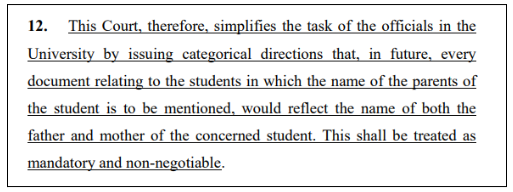
SC: A relationship may be consensual at the beginning, but the same state may not remain so for all time to come
In the case, Rajkumar vs. the State of Karnataka, the appellant was previously in a relationship with a woman who filed the FIR against him accusing him of multiple offences under the Indian Penal Code and the Information Technology Act including rape, criminal intimidation, cheating, assault, abduction, etc. He initially sought to have the FIR quashed in the Karnataka High Court, but after an unsuccessful attempt, appealed to the Supreme Court. The appellant argued that the complainant’s actions were in retaliation for a previous complaint of blackmailing and extortion.
The Supreme Court Bench of Justices Aniruddha Bose and Sanjay Kumar, while acknowledging that consensual relationships cannot lead to a rape charge, observed that the complainant’s allegations did not demonstrate continued consent. The Court, therefore, refused to quash the FIR, stating that the relationship had ceased to be consensual, and affirmed that the complaint contained the necessary elements for the alleged offences. It observed that a relationship may be consensual at the beginning, but the same state may not remain so for all time to come. Whenever one of the partners shows their unwillingness to continue with such a relationship, the character of such relationship as it was when started will not continue to prevail. The Court directed measures to protect the complainant’s identity in future proceedings across all relevant courts.
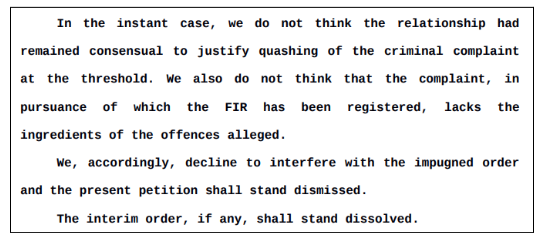
SC: Medical Council report, while relevant, cannot be conclusive when it contradicts consumer forum findings
In Najrul Seikh vs. Dr Sumit Banerjee and another, the appellant’s son had lost vision in his right eye after cataract surgery performed by Dr. Sumit Banerjee and Megha Eye Clinic in Bardhaman, West Bengal. He had sought compensation for the same. While the District Consumer Disputes Redressal Commission (DCDRC) initially allowed the compensation noting deficiencies in the service provided by the hospital, the State Commission (SCDRC) and the National Consumer Disputes Redressal Commission (NCDRC) set it aside, relying on a Medical Council report.
The Supreme Court Bench of Justices Vikram Nath and Satish Chandra Sharma referred to the findings of DCDRC. DCDRC had specifically identified deficiencies in the duty of care by the doctor related to both pre-operative and post-operative standards for traumatic cataract surgery. The findings established a connection between post-operative lapses, such as delayed review and failure to use the appropriate surgical method, and the subsequent loss of vision.
Allowing the appeal and upholding the DCDRC’s decision, the Bench noted that the SCDRC and NCDRC, despite evidence of negligence, relied solely on the Medical Council report, neglecting DCDRC’s findings. The Medical Council report lacked depth in evaluating pre and post-operative care. It added that the Medical Council report, while relevant, cannot be conclusive when it contradicts consumer forum findings. The appellate forum must conduct a thorough examination, warranting the reversal of SCDRC and DCDRC orders. The DCDRC’s unchallenged findings on post-operative lapses, reinforced by the Medical Council and the respondent doctor’s admission of difficulties in managing traumatic cataracts in children, affirmed a deficiency in the medical services provided by the Respondents.
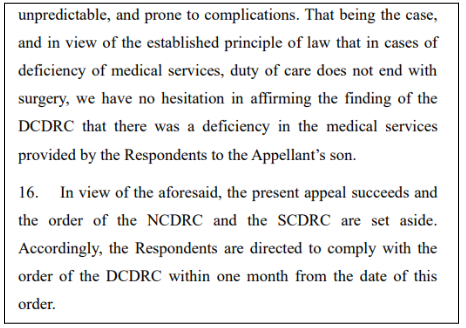
The Supreme Court emphasized the importance of expert testimony, stating that the Medical Council report alone is insufficient to exonerate the doctor. The Court upheld the DCDRC’s compensation order of Rs. 9,00,000.
SC: Appellant quashed of suicide abetment charges after two decades
The case, Prabhat Kumar Mishra vs. the State of UP & Another before the Supreme Court is an appeal to quash the proceedings against the accused-appellant. He was facing charges under Section 306 of the Indian Penal Code (abetment to suicide) and Section 3(2)(v) of the Scheduled Castes and the Scheduled Tribes (Prevention of Atrocities) Act, 1989. The accused-appellant, who worked as the District Savings Officer in Kannauj District, was implicated in the suicide case of Data Ram, a Senior Clerk at the Child Welfare Board, Fatehgarh in 2002. The appellant, dissatisfied with the High Court’s decision not to quash the criminal case, filed a Special Leave Petition with the Supreme Court.
The Supreme Court Bench of Justices BR Gavai and Sandeep Mehta observed that the admitted allegations did not establish the essential elements of the offense under Section 3(2)(v) of the SC/ST Act, justifying no prosecution of the accused-appellant for this offence. It quoted some significant judgements about what constitutes an offense under the Act.
Upon scrutiny of the suicide note, based on which the chargesheet of the case was filed, the Supreme Court concluded that its contents did not suggest any action or negligence by the accused-appellant that would make him culpable for abetment. It also added that the deceased was frustrated due to work pressure and various unrelated factors, including the stress of working in two different districts, it held. Observing that, these expressed apprehensions in the suicide note cannot reasonably be deemed sufficient to hold the appellant responsible for abetment to commit suicide, the Bench quashed the charges against the appellant, after more than two decades since the case was filed.
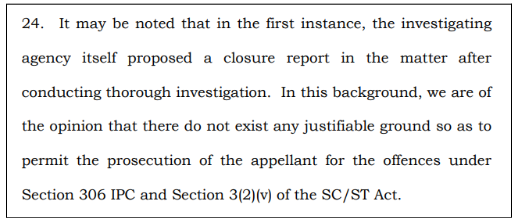
SC: Custodial interrogation is not a sufficient reason to deny anticipatory bail
In the case, Ashok Kumar vs. State of UT Chandigarh, the appellant and other co-accused faced charges under various sections including forgery, conspiracy, and corruption. The appellant sought anticipatory bail from the Sessions Court and subsequently the High Court, but both courts denied the request. He then appealed to the Supreme Court.
It was contended that the appellant had appeared before the Investigating Officer for interrogation, and his statements were recorded, along with the collection of specimen signatures/handwritings sent to the Forensic Science Laboratory which made him eligible for bail. The respondent-Union Territory of Chandigarh, strongly opposed the plea, citing the necessity of custodial interrogation for the main accused.
The Supreme Court Bench of Justices JB Pardiwala and Manoj Misra observed that the appellant was actively cooperating in the ongoing investigation. Acknowledging the effectiveness of custodial interrogation, the Bench observed that its absence alone may not justify anticipatory bail for serious offences, demanding a more substantial case from the State. Noting that the appellant pledged future cooperation, the Supreme Court allowed the appeal and set aside the High Court’s, granting bail upon arrest, with terms at the Investigating Officer’s discretion.
